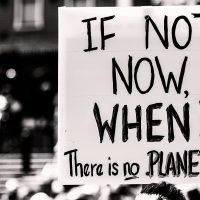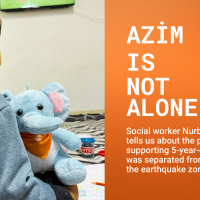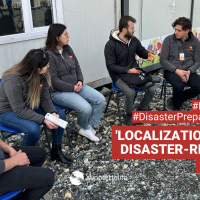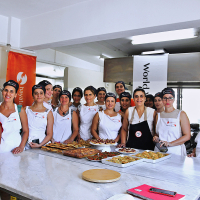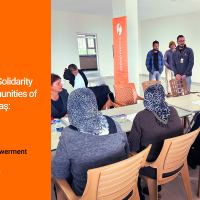One of the best ways to recover after a disaster is by overcoming trauma through solidarity and unity. Sharing experiences, talking to each other, and lightening the burden through conversation help in healing. Learning together, gaining new experiences together, and producing together speed up the psychological healing process. In Hatay, one of the cities that suffered the most destruction and loss in the February 6th Earthquakes, we have continued our humanitarian aid efforts from the first day of the disaster, following this very path.
Our activities during the emergency aid period are shaped by developments and changing needs on the ground. Since the beginning of 2024, our focus has been on supporting livelihoods. One of our important partners is the humanitarian aid organization World Vision Syria Response, with whom we have been collaborating since the beginning of our emergency operation. After our previous work addressing hygiene needs in the earthquake zone, we are now organizing vocational trainings in collaboration with our partner in this new project period. In mid-May, I also went to Hatay to follow up on the developments in our new project.
On a breezy yet bright May morning, we meet with our project team and set off from our office in Narlıca. Accompanying me are Hatice, Gülistan, and Emsal. Our destination is the Defne district. Our route passes through Antakya. Most of the buildings are destroyed, and the roads are still damaged. The wind and the debris trucks raise dust from the rubble, turning everything a sandy yellow color. Even a short distance takes a long time due to the damaged roads. Hatay is like a massive construction site, and transportation remains one of the biggest challenges in the city. During our journey, my team and I discuss the project's progress and troubles. They mention that setting up the planned vocational workshops has been quite challenging, with logistical difficulties being a significant trouble. The quickest progress has been made with the sewing workshops involving women. Our project officer Gülistan shares an unforgettable comment from one of the women participants: “Coming here saved us from being stuck within four walls; it gave us a breath of fresh air.” We are visiting one of those workshops at the Defne Özyeğin Container City. As soon as we step inside, the enthusiasm in the atmosphere is contagious, almost as if the clouds over us have lifted.
Since the beginning of April, we have been providing materials and essential machine needs for the sewing workshop, which we support in collaboration with Public Education. Women who are sitting at a sewing machine for the first time and those who already know how to sew are working side by side. We start chatting with the women. They mention that besides the technical training provided in the courses, they learn a lot from each other as well. In fact, they have now started producing at a professional level and are ready to take their products to market. Their product range is quite extensive.
 Menekşe, one of the course participants, began sewing in this workshop and, as she spoke with us, she was diligently sewing pieces for a bed linen set:
Menekşe, one of the course participants, began sewing in this workshop and, as she spoke with us, she was diligently sewing pieces for a bed linen set:
"I am sewing a fitted sheet. Here, we don't just sew clothing items. Coming here is very beneficial for both me and my friends. We produce together. We meet our own needs as well as the needs of others."
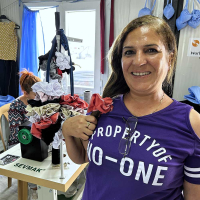 The women emphasize how happy it makes them to meet their children's clothing needs with what they produce in this workshop, especially after the deprivation they faced following the earthquake. Elvan shows us the hair accessories and adds:
The women emphasize how happy it makes them to meet their children's clothing needs with what they produce in this workshop, especially after the deprivation they faced following the earthquake. Elvan shows us the hair accessories and adds:
"In the workshop, we make use of every piece of fabric and material. For example, we made these hair clips and bandanas from leftover fabric. Additionally, with the leftover fabric from sewing storage bags, we made washable and reusable shopping bags. We will be selling these functional items at the charity fair in June."
Course participant Elif also highlights the psychological benefits of producing as she shows us a storage bag she sewed that will be displayed at the charity fair:
"I have been here since the course first started. I am very happy here. This workshop has added so much to our lives that it has truly changed everything for us. First of all, I would like to thank everyone who contributed to this support. We have learned so much. Learning new things and producing new items makes us feel really good. And do you know what feels the best? While we are working and creating here, we forget all the pain caused by the earthquake and we heal."
While listening to the women, I remembered the words of our project manager Ahmad, who spoke about the potential healing power of this project. Ahmad had expressed it this way: "These courses are organized not only to help those affected by the earthquake obtain vocational certificates but also to provide them with a more social environment. As the courses facilitate social interaction, we help people maintain their hope and move towards a safer future."
 At that moment, Yeliz finishes ironing her pomegranate-colored jersey, puts it on, and joyfully steps into the middle of the workshop to model it for us.
At that moment, Yeliz finishes ironing her pomegranate-colored jersey, puts it on, and joyfully steps into the middle of the workshop to model it for us.
"Isn't it very beautiful? I made it. I love the pomegranate flower color. It makes me forget all my troubles and brings me joy."
Of course, we share in this joy. A wide smile spreads across our faces. The excitement of the women about the event where these beautiful products will be displayed is infectious. We leave the workshop with our spirits renewed.
On June 4th, as I was preparing this blog post, my smile grew even wider with news from our Hatay team. Our project officer Gülistan reported that the products exhibited as part of the Defne Public Education Center's Lifelong Learning Week event were highly appreciated mainly by protocol guests. The women earned income from the sale of their products during the charity fair.
Yes, Hatay is going through a very difficult period. But the people of Hatay will overcome this challenging time through solidarity. And we will be there to support them in this process.
*The names of the beneficiaries whose testimonies are included in this article have been changed to protect their personal rights.
Çiğdem Güner
Communications Manager / Hatay
Thank you for reading the article and for coming this far. Now you can support life while you are here.



